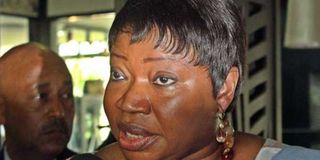Politics aside, jailing Ruto at The Hague would be a disaster for the Rift Valley

International Criminal Court (ICC) Chief Prosecutor Fatou Bensouda. In July 2013, Ipsos, which has tracked perceptions of the ICC since 2010, asked respondents whether they backed the Hague option as a means for getting justice for the 2007/8 post-election crisis. PHOTO | AFP
What you need to know:
- They found that fully 70 per cent of respondents in Nyanza (home to Raila Odinga) supported the ICC process while in Rift Valley (William Ruto’s base) support stood at 24 per cent and in Uhuru Kenyatta’s turf in Central, only a meagre 7 per cent endorsed The Hague.
- Will the course of justice be seen as having been served when only the crimes committed by the Kalenjin youth are accounted for and those perpetrated by the other ethnic groups and the police are left unaccounted for?
- Ivory Coast is today bitterly divided because only Laurent Gbagbo ended up in The Hague while his rivals, who were similarly accused of committing mass crimes, enjoy the trappings of power.
Kenyans tend to be divided about most things but their differences are displayed especially starkly every time the pollsters ask about the International Criminal Court.
In July 2013, Ipsos, which has tracked perceptions of the ICC since 2010, asked respondents whether they backed the Hague option as a means for getting justice for the 2007/8 post-election crisis.
They found that fully 70 per cent of respondents in Nyanza (home to Raila Odinga) supported the ICC process while in Rift Valley (William Ruto’s base) support stood at 24 per cent and in Uhuru Kenyatta’s turf in Central, only a meagre 7 per cent endorsed The Hague.
That situation neatly sums up the trouble with resolving deep-seated political problems through criminal trials.
Shocked by the savage violence meted out on innocent Kenyans in the wake of the 2007 election, I, like many Kenyans, strongly supported the ICC as a means of warning Kenyan politicians that violence cannot be a legitimate tool of political mobilisation in the 21st century.
But the way the cases have unfolded and the fact that only ethnic Kalenjins now remain on the dock in The Hague means that the ICC process can only be viewed as a liability to the prospects of long-term peace and reconciliation.
COURSE OF JUSTICE
Set to one side the political circus about who fixed who and the point scoring between the various factions and their propaganda battalions.
The difficult and awkward question is this: What will the possible conviction of William Ruto and Joshua Sang mean for the prospects of peace and reconciliation in the Rift Valley?
Will the course of justice be seen as having been served when only the crimes committed by the Kalenjin youth are accounted for and those perpetrated by the other ethnic groups and the police are left unaccounted for?
On February 5, 2014, the Columbia University Professor Mahmood Mamdani and the former South African president Thabo Mbeki wrote a strongly argued article in the New York Times on this subject.
They pointed out that dealing with “politically driven mass violence” was a complex issue not suited to courts of law because “political violence has a constituency and is driven by issues, not just perpetrators”.
In the case of the Rift Valley, the issue is land rights and the vexed question of “natives” versus “foreigners”.
It is not a new subject. After the colonialists displaced tens of thousands of members of the Kikuyu community from the central highlands and pushed them to the Rift Valley, the land question became the most important mobilising factor in that region.
AMNESTY FOR KILLERS
As far back as 1962, African Elected Member of Parliament William Murgor was warning that he would blow the “war whistle” from the Lancaster House conference if majimbo (federalism)was rejected while on the ground villagers on both sides made preparations for a war over land after independence.
Politicians have exploited this tension over land ownership to trigger violence during various election cycles but it is an inarguable fact that there is something that informs this tension and there have been no honest efforts to confront the issue.
Mamdani and Mbeki made the case that the South African model of truth and reconciliation would be more helpful for countries like Kenya than the Nuremberg model of criminal trials.
Another example is the Northern Ireland approach where Tony Blair offered many of the Irish nationalist killers amnesty in exchange for participation in the peace process which helped to end the 30-year war in that country.
BITTERLY DIVIDED
This is not an easy case to make especially considering the interests of the many victims.
But moving away from the Cord-Jubilee divide over the ICC process, an outcome which results in the conviction of only one alleged set of perpetrators will be problematic for the long-term prospects of peace and meaningful reconciliation in the Rift Valley.
Ivory Coast is today bitterly divided because only Laurent Gbagbo ended up in The Hague while his rivals, who were similarly accused of committing mass crimes, enjoy the trappings of power.
In Kenya, the conviction of Ruto may cheer some for political reasons but I’m moved to agree with Mamdani and Mbeki that “fixating less on perpetrators and particular atrocities, and being more alert to issues that drive continuous cycles of conflict from which communities need to emerge” would be a wiser long-term option for Kenya.





